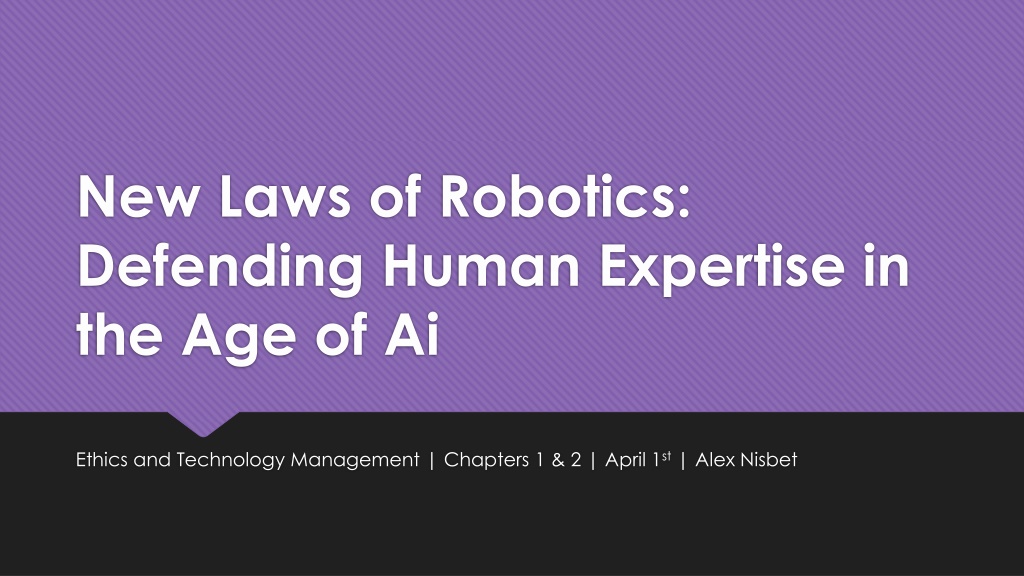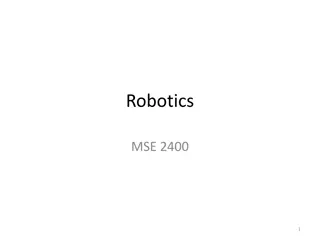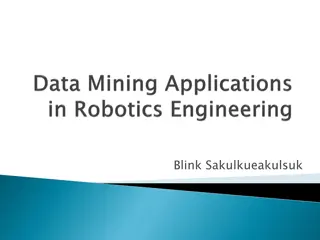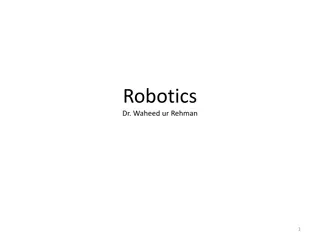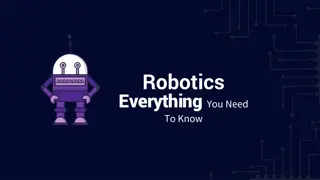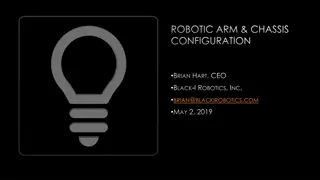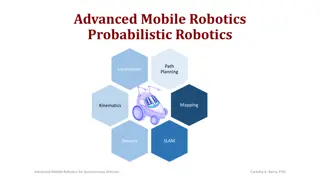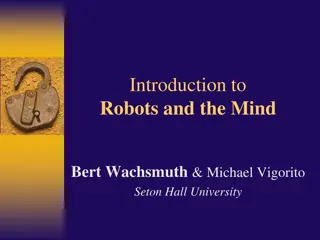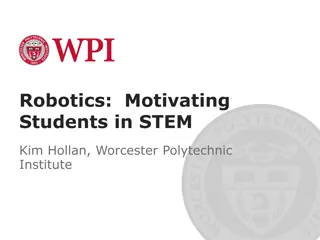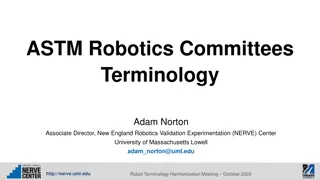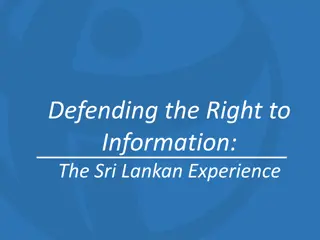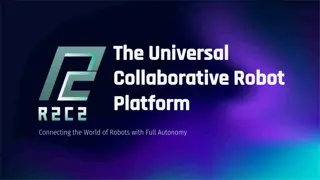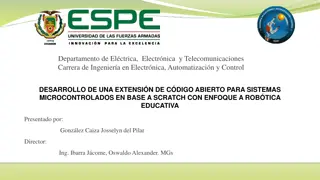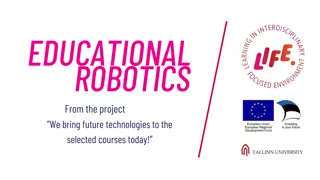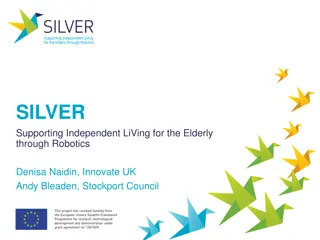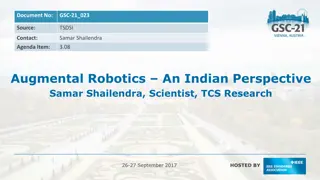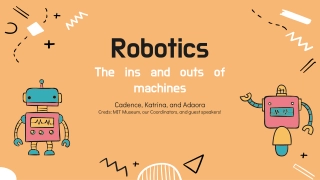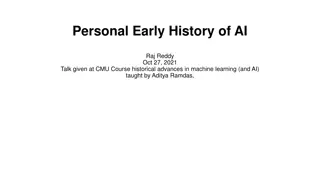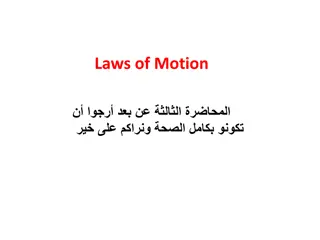New Laws of Robotics: Defending Human Expertise in the Age of AI - Chapters 1 & 2
Introduction to the core thesis of channeling automation technologies to benefit human labor, discussing Asimov's Laws, and presenting new laws safeguarding professional roles in robotics. Focus shifts to professionalism, expertise protection, and ethical considerations in healthcare AI in Chapter 2.
Download Presentation

Please find below an Image/Link to download the presentation.
The content on the website is provided AS IS for your information and personal use only. It may not be sold, licensed, or shared on other websites without obtaining consent from the author. Download presentation by click this link. If you encounter any issues during the download, it is possible that the publisher has removed the file from their server.
E N D
Presentation Transcript
New Laws of Robotics: Defending Human Expertise in the Age of Ai Ethics and Technology Management | Chapters 1 & 2 | April 1st| Alex Nisbet
Chapter 1: Introduction Core Thesis: We now have the means to channel technologies of automation, rather than being captured or transformed by them. Utilize existing legal and regulatory structures to ensure robots beneficially augment existing human labor capabilities. Values are inherently designed into technology; thus, society can dictate what values are emphasized through its intention in technological design Asimov s Laws (1942) (1) A robot may not injure a human being or, through inaction, allow a human being to come to harm (2) A robot must obey the orders given to it by human beings except where such orders would conflict with the First Law. (3) A robot must protect its own existence as long as such protection does not conflict with the First or Second Laws
New Laws of Robotics (1) Robotic Systems and AI should complement professionals, not replace them. (2) Robotic Systems and AI should not counterfeit humanity. (3) Robotic Systems and AI should not intensify zero-sum arms races. (4) Robotic Systems and AI must always indicate the identity of their creator(s), controller(s), and owner(s). Discussion Questions: 1. Overall thoughts on these new laws? 2. Pasquale mentions that robots should be prioritized as labor-augmenting to prevent the disruption of vocations. Is this feasible? Aren t all jobs vocations to someone? 3. Does his emphasis on preserving intellectual, professional roles over-protect educated and white-collar work while leaving trade and labor-intensive jobs behind?
Introduction (cont.) Professionalism and Expertise Professionalism: A recurrent need to deal with the conflicts of values and duties, and even conflicting accounts of facts. In every online or automated system there are many affected parties: engineers, legislators, and those affected Focuses on professionals as those who ought to be emphasized The protection of variance The Benefit of Cost Reporting on automation has been, at times, apocalyptic Universal Basic Income An implicit Good within cost
Introduction (Cont.) (1) If expertise is to be protected, how do we define what expertise is and who possesses it? (2) Should the car strike the pedestrians? Or kill the driver? (3) Who does, Professionalism, leave behind? (4) Is it possible to codify purposeful variance? Discussion Questions
Chapter 2: Healing Humans Healthcare Towards a utopian healthcare infustructure Emphasize the unique attributes that the human experience can offer to medicine Healthcare access inequities Algorithmic improvements (e.g., Google s work to prevent medical misinformation) AI s Core Competence: Avoiding Common Errors AI working to reduce dangerous mistakes that have health-damaging potential Image comparison software within Dermatology Clinical Decision Support Software Legal complexities of holding rogue physicians accountable, while also preserving room for innovation
Chapter 2. (cont.) Data, Discrimination, and Health Disparities Risk Scores are only as equitable as the historical data sets informing them Caroline Perez: Women are not just smaller men. Tension between innovation and regulation Discussion Questions: 1. Pasquale is extremely confident that expertise will not be replaced. Is he too hopeful in this thought? 2. The current legal landscape ensures that physicians can disagree with CDSS using their own professional background. How might this change as the accuracy of A.I. surpasses physicians? 3. Similar to our discussion on Tuesday concerning the intrinsic good of effortful, genuine care, is there an intrinsic good to imperfect, but adaptable, medical care? 4. Who is responsible for ensuring or checking the equity of data sets? Are equitable datasets even possible considering the history of system inequality present in many western countries?
Chapter 2. (cont.) Who will teach the Learning Health Care System? Learning health care systems have a great potential to benefit our capacity to care for disease Potential to exacerbate existing priority shifts towards efficiency (e.g., Radiology teams) Stratification into tiers of healthcare Tiering may trade current cost savings for later uneven medical advances Therapy Apps Mental illness is increasingly triaged through automated systems ELIZA Woebot towards a continuation of the frictionless drift? Predictive analytics require yes/no binaries RoboCare: Liberating caregivers? Losing human touch of healthcare? Carebots (e.g., Japanese Robear or Paro) may free caregivers to prioritize human interaction Augmenting caregivers vs. replacing them The role of stringent immigration laws in limiting care-giving workers South Korean human over machine hierarchy vs. Japan s partner-based framework
Discussion Questions: With robots as a vision of practice the practice of caregiving, how does our use of robots in the healthcare setting reflect on our virtues within the field? 1. Will people pay more to avoid AI- driven healthcare? Should they be allowed to do so? 2. Do our concerns over the influence of AI in healthcare change as we consider mental, rather than physical, health? 3. How genuine are Paro s worries that people will justify ignoring visits to their elderly due to the presence of robots? A final consideration 4. Where should we fall on the spectrum between South Korea and Japan s relation conceptions of humans & machines? Where s the middle ground?
